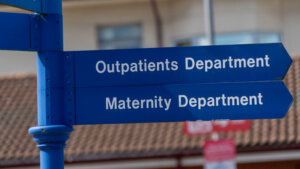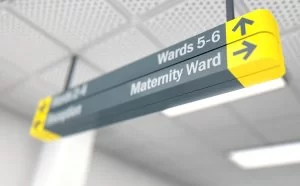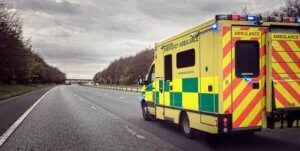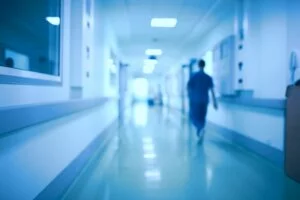Never Events in the NHS

Contact
Table of Contents
The NHS performs over 7 million surgical procedures every year, and the vast majority of these are successful. However, occasionally something goes wrong, sometimes due to the negligence of the medical professionals responsible for the patient’s care. Whilst some errors can be rectified quickly and with little adverse effect on the patient, some errors can have devastating and life-changing consequences.
What Are Never Events?
The NHS defines so-called Never Events as “serious incidents that are wholly preventable because guidance or safety recommendations that provide strong systemic protective barriers are available at a national level and should have been implemented by all healthcare providers”. NHS England has developed a list of Never Events which are periodically reviewed and which were last updated in February 2021.
Examples of never events include:
- performing surgery at the wrong site;
- retained foreign objects following a surgical procedure;
- administering certain medication through the wrong route;
- patient falls from a poorly restricted window;
- misplaced nasogastric or oro-gastric tubes.
Can you claim compensation for Never Events?
Hospitals have policies and frameworks in place to investigate serious incidents, including never events. Under the duty of candour healthcare providers have a statutory duty to be open and honest with patients when things go wrong during their care.
Never events should, quite simply, never happen if guidance or safety recommendations at a national level are properly implemented. If you have experienced a never event during your medical treatment it may be possible to claim compensation. The NHS has a structured complaints procedure that allows patients or their families to raise concerns about never events. The NHS Complaints Procedure provides a formal way to ensure your grievances are heard and addressed.
Case Studies: The Impact of Never Events
Removal of fallopian tube on the wrong side
One such never event reported recently was the case of 27-year-old Chelsie Thomas, who was admitted to Walsall Manor Hospital suffering from an ectopic pregnancy. Miss Thomas was booked in for a procedure to remove her right fallopian tube, however, she was informed one week following the procedure that the doctor had accidentally removed the left fallopian tube. As a result, Miss Thomas was taken back to the operating theatre the following morning for her right fallopian tube to be removed. Miss Thomas has been told that she will be unable to have children in future without IVF treatment.
Whilst the Trust responsible for managing the hospital apologised for this error, the wider effect on Miss Thomas’s life has been devastating. She has been diagnosed with severe depression for which she is taking anti-depressants, her relationship with her partner broke down, and she has lost her job.
It is clear in the above case that the surgery was carried out without due diligence and attention from the surgeon concerned. Miss Thomas will, as a result of what has happened, be entitled to pursue a claim against the Trust concerned and whilst money cannot adequately compensate for what has happened, it can assist those who have suffered as a result of clinical negligence in accessing things like future treatment.
Staple left in man’s shoulder
One such case which we dealt with involved a 33 year old man who had a history of repeated episodes of shoulder dislocation. He was referred to an orthopaedic surgeon at University College London Hospital in Euston and was booked in for surgical management in the form of a stabilisation procedure.
Our client underwent a bone block with an anterior stabilisation procedure on 6 July 2016 and he was told that there were no complications during the surgery. However, in the weeks following the procedure our client experienced redness and swelling on and around the wound on his shoulder, which appeared to be infected. An x-ray was undertaken, and there appeared to be no concerns.
On 21 July 2016, our client noticed that the skin on the surface of the wound had broken and puss was oozing from the wound. The pain and discomfort in his shoulder continued and eventually our client attended A&E on 22 July 2016. He was told he was suffering from a superficial wound infection and discharged on antibiotics.
Our client was reviewed again in the clinic on 28 July 2016 and it was noted that there was some pus being expressed from the wound. A swab was sent, our client was advised to continue taking his antibiotics and he was booked for a follow up in August 2016.
On attending the follow-up appointment on 4 August 2016, our client was reviewed by the consultant and it was noted his wound was improving but not completely closed. The consultant reviewed our client’s x-ray taken on 21 July 2016 and noted that this showed that a surgical staple remained in the shoulder at the level of the wound and had become infected. He was booked in for surgery the following day under a general anaesthetic to remove the staple from his shoulder.
A Letter of Claim was sent to the Trust, which promptly admitted liability for our client’s claim, and after a period of negotiation, a financial settlement was achieved.
Whilst the consequences, in this case, were relatively mild, some never events can have fatal consequences.
Fatality due to failure to provide medication
Osbornes Law recently acted in a clinical negligence claim brought by the son of a 78-year-old lady who sadly passed away as a result of a never event at the Whittington Hospital in London.
Mrs DS first presented at the A&E department at Whittington Hospital on 31 August 2016 complaining of a 3-week history of shortness of breath and reduced exercise tolerance. A CT scan was performed which showed that she was suffering from bilateral pulmonary emboli. She was commenced on a treatment dose of Tinzaparin (blood thinning medication) and kept in hospital overnight. It was noted by the hospital that Mrs DS’s home life was chaotic and that her compliance with her required medication regime could be low. It was explained to Mrs DS that if she did not take her medication she could die, however, given the doctors’ concerns she was persuaded to remain as an inpatient for treatment.
However, Mrs DS was keen to discharge herself and eventually on 5 September 2016, following a review by the mental health liaison team, she was deemed fit for discharge. Her son was not informed of her discharge and believed she was still in hospital. Mrs DS was discharged on Tinzaparin to be administered subcutaneously each afternoon by a district nurse at 2 p.m. for 28 days and a referral was made to the district nurse accordingly. Mrs DS was not given the telephone number of the district nurses, and was not told to call anyone if the district nurse failed to attend the following day.
Despite the referral having been attempted, an obsolete email address that had not been deleted from the computer system was used by the Whittington Hospital to make the district nurse referral, and as a result of this error, the referral was never received by the district nurses. No follow up letter or telephone call was made to the district nurses.
As a result of this, a district nurse failed to attend Mrs DS following her discharge from the Whittington Hospital on 5 September 2016. Mrs DS, therefore, did not receive the required injections of Tinzaparin on 5 September 2016, nor on any subsequent day leading up to her death on 15 September 2016.
On the evening of 14 September 2016, Mrs DS collapsed at home. Her son was at home with her but in a different room. He ran to her assistance. Mrs DS’s home landline was not in working order and so her son ran next door to her neighbour who telephoned for an ambulance immediately. An ambulance arrived within approximately 15 minutes and Mrs DS was taken to the Whittington Hospital.
On arrival at the hospital, the medical and nursing staff at the Whittington Hospital were unable to revive Mrs DS and she was pronounced dead shortly thereafter. The cause of death was noted to be pulmonary thromboembolism.
An inquest was subsequently held into Mrs DS’s death and the coroner found that had she received the Tinzaparin as prescribed for the preceding ten days, Mrs DS would not have died when she did.
Osbornes wrote a Letter of Claim to the Trust and four months later admission of liability was received. Negotiations commenced and eventually, a five-figure settlement was achieved on behalf of Mrs DS’ son. In order to receive the compensation Mrs DS’ son was required to obtain a Grant of Probate in order to be appointed as the representative of his late mother’s estate, and the Private Client team at Osbornes were able to assist him with this process.
Legal Support
At Osbornes Law we care about how you are treated both by medical professionals at your GP surgery or at hospital and also under the care of private providers of health services. We have many years’ experience of dealing with claims under the Fatal Accidents Act 1976 and the Law Reform (Miscellaneous Provisions) Act 1934, and our Private Client Department can assist in obtaining a Grant of Probate/Letters of Administration.
If you think that the care you or a loved one has received fell below the standard expected of a reasonably competent professional, then please do not hesitate to contact us on 020 7485 8811.
Share this article
“Osbornes handles a wide range of high-value and complex clinical negligence cases, with particular expertise in birth injury, delayed cancer diagnosis, spinal injury, and fatal claims.”
“Osbornes Law is an established firm which handles a breadth of complex and high-value clinical negligence matters.”
Contact us today
Call us 020 7485 8811
Email us Send us an email and we’ll get back to you
More from JodiVIEW ALL
- 19.2.2026
Supreme Court Allows Children to Claim Lost Years...
Landmark Supreme Court ruling: children can now claim lost years compensation for medical negligence On 18 February 2026 judgment was handed down...
Read more - 3.12.2025
Liability Secured for Child with Cerebral Palsy
Full admissions of liability secured on behalf of child with quadriplegic cerebral palsy Jodi Newton, Partner in our Medical Negligence...
Read more - 30.10.2025
Addenbrooke’s Hospital Complaints
Review finds harm to children by surgeon at Addenbrooke’s Hospital An independent review by Cambridge University Hospitals NHS Foundation...
Read more - 27.8.2025
HSSIB Review Exposes NHS Maternity Failures
Patient safety body HSSIB publishes exploratory review of maternity and neonatal services As Head of Paediatric and Birth Negligence cases...
Read more - 10.7.2025
£700K Settlement for Crohn’s Disease Negligence
Negligent delay in diagnosing Crohn’s disease leads to £700K settlement Jodi Newton, Partner, was instructed in a case against...
Read more - 12.5.2025
Complaints Against Suspended Surgeon Ms Kuldeep Stohr
Ms Kuldeep Stohr, orthopaedic surgeon at Addenbrooke’s Hospital suspended In February 2025, Cambridge University Hospitals NHS Foundation Trust (CUH) confirmed...
Read more - 6.5.2025
Six-Figure Settlement for Negligent C-Section Delivery
Osbornes secures a six-figure settlement following a negligent caesarean section delivery Jodi Newton, Partner and head of our Obstetric and...
Read more - 14.10.2024
Multi-Million Settlement in Cerebral Palsy Negligence Case
Judge awards multi-million settlement in cerebral palsy medical negligence claim Jodi Newton, Partner and specialist medical negligence lawyer at Osbornes...
Read more - 12.9.2024
Great Ormond Street Hospital Negligence & How to Claim
Review of negligence at Great Ormond Street Hospital At Osbornes Law, we’ve supported families through some of the most...
Read more - 29.8.2024
AB v Central London Community Healthcare NHS Trust
Background Our client, AB, had been using the Nexplanon contraceptive device for 6 years. She had a Nexplanon device inserted into...
Read more - 30.7.2024
What Is the Role Of a Physician Associate?
What does the Position of Physician Associate Mean for the NHS? There are many different jobs within the NHS, each...
Read more - 9.5.2024
Claim Against Royal Free London NHS Foundation Trust...
Client obtains settlement after being victim of a surgical negligence Jodi Newton, Partner in our Clinical Negligence department, recently settled...
Read more - 11.1.2024
New UK Supreme Court Ruling regarding Secondary Victims...
The Supreme Court has today, on the 11th January 2024, upheld the Court of Appeal’s order to dismiss the claims...
Read more - 11.1.2024
Secondary Victim Claims
Secondary victims in clinical negligence cases What is a secondary victim in clinical negligence cases? Most compensation claims are concerned...
Read more - 12.12.2023
NHS Compensation Payouts Guide
What Are NHS Compensation Payouts? In the UK, the National Health Service delivers the vast majority of healthcare services. When...
Read more - 21.9.2023
Large Compensation for Delayed Laryngeal Cancer Diagnosis
Actress receives financial award after life-changing missed cancer diagnosis. Jodi Newton acted for a client who was belatedly diagnosed with...
Read more - 21.9.2023
Delayed cervical cancer diagnosis client story
Introduction Jodi Newton acted for a woman who died following a delayed cervical cancer diagnosis. The deceased could have been...
Read more - 19.9.2023
Appendicitis Compensation Claim
Appendicitis misdiagnosis case settles for 5-figure sum Osbornes Law were instructed in a medical negligence claim against Bedfordshire Hospitals NHS...
Read more - 19.9.2023
Spinal Fracture Case Settles for 6-figure Sum
Spinal Fractures following cessation of Denosumab injection Case Overview Osbornes Law were instructed in a spinal injury claim against Mid...
Read more - 31.8.2023
Can you sue the NHS for waiting times?
The NHS is facing an unprecedented challenge with 7.47 million people waiting for routine treatments. This crisis impacts everyone, from those...
Read more - 31.8.2023
Hyponatraemia – Symptoms, Causes & Negligence
What is hyponatraemia? Hyponatraemia is a condition where sodium levels fall below a certain level, which can be dangerous. All...
Read more - 10.8.2023
Ambulance Delays Affecting Rapid Patient Treatment
Failure to Meet Ambulance Response Targets In 2017, the Secretary of State for Health accepted the new ambulance performance standards recommended...
Read more - 1.8.2023
Bowel Ischaemia Fatality – Client Story
Jodi Newton, a Partner in the Clinical Negligence Department at Osbornes Law, has recently settled a long running fatal medical...
Read more - 9.6.2023
Early Notification Scheme – is it helping or failing...
What is the Early Notification Scheme? The NHS Early Notification Scheme (“ENS”) has reached its sixth anniversary. Established in April 2017,...
Read more
























